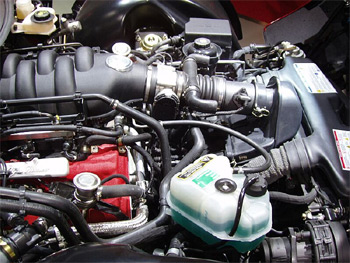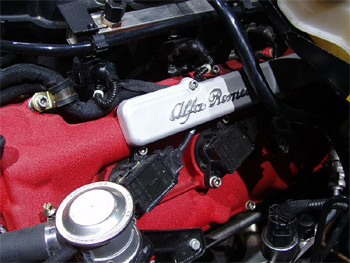|
Development is
underway at the Orbassano (Turin) based Fiat Research Centre
on new six- and seven-speed double clutch transmissions,
which are set for application on vehicles within the Fiat
Auto and Ferrari ranges' as soon as 2010. Although direct shift gearboxes have been offered by Volkswagen and Audi since mid-2003, the principle behind the system dates back to the 1930’s, when French engineer Adolphe Kégresse devised a double clutch transmission for application on the Citroen Traction
Avant.
In a nut shell, the idea behind double clutch transmissions is to provide for a system which avoids interruption of tractive power during gearshifts. Two clutches are arranged upstream of the gearbox, and are connected by concentric shafts to conventional synchro shift slider-sleeve units. For example, the hollow outer shaft could drive the slider-sleeves of the even ratios, (2nd, 4th, 6th) whilst the inner shaft drives the slider-sleeves of the odd ratios (1st, 3rd, 5th). This arrangement typically allows for the pre-selection of gears whilst the engine is in traction, with the eventual shift being carried out under load, by disengaging a clutch while simultaneously engaging the other. Ideally the
double clutch layout is used in combination with automatic or sequential gearboxes.
The Fiat double clutch transmission is being engineered to
ensure maximum comfort, arranged in such a manner that the
clutch-actuating forces are not discharged onto the
crankshaft of the engine, and do not therefore represent a
potential critical factor for the axial supports of the
engine.In addition, the Fiat system can operate in spite of misalignments and eccentricities between the crankshaft and the gearbox input shafts. Furthermore the Fiat
double clutch gearbox includes a clutch unit designed to filter out the torsional and axial oscillations of the crankshaft, thus providing for optimal comfort as well as increased reliability due to reduced gearbox
wear.
|

 |
|
Future
Fiat Auto vehicles fitted with longitudinal
engines will likely be the first to be fitted with the
new range of Fiat double-clutch
transmissions. |
|
|

 |
|
Centro
Ricerche Fiat (CRF) in Turin are presently developing
a new family of double-clutch
gearboxes, which eliminate the discharge of
clutch related to the forces on the crankshaft of the
engine. |
|
|
The main advantage of the Fiat
double clutch transmission is that the crankshaft, and consequently also its axial supports (usually friction bearings), are not loaded axially during the actuation (disengagement/engagement) of the clutches. This characteristic allows for an increase in the axial loads required to actuate the clutches without thereby increasing the stresses on the axial bearings of the crankshaft. It is also possible to reduce the lever arms of the disc which bring about the disengagement/engagement of the clutches, with a consequent reduction in the actuation travel required.
In addition, the new gearbox has a simple architecture
which is been designed with space saving and low
manufacturing costs in mind.
Engineers at CRF are working on a servo-assisted control system of the electro-hydraulic type,
particularly for six- and seven- speed double clutch
gearboxes. One of the main advantages of the electro-hydraulic control system is the small number of components and therefore low relative cost. In addition the system allows the gearbox to perform the greatest possible number of multiple gear changes in "power shift" mode directly (that is non-sequentially) available from the gearbox architecture (for example during the following downshift manoeuvres, from
7th to 4th or 2nd, from 6th to 3rd or 1st, from 5th to 2nd and from
4th to 1st). The system is also easily adaptable to different gearbox versions in such a way as to allow a further reduction in the costs of production.
Future vehicles with longitudinal engines, particularly belonging to the long-term Alfa Romeo-Maserati joint architecture programme, such as the Alfa Romeo 169,
as well as new Ferrari models will likely be the first to be fitted with the Fiat
double clutch transmissions.
by Paddy Granger
|
|
|
|
![]()
![]()